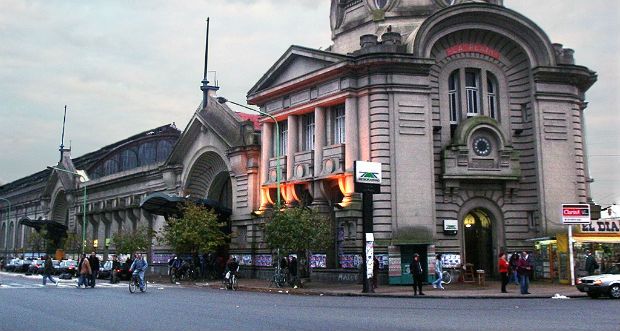Known as La Ciudad de las Diagonales – the City of Diagonals – La Plata is one of Argentina’s most important, albeit often overlooked, cities. Home to an enormous talent pool and budding startup community, the capital of the Province of Buenos Aires is the birthplace of one of Latin America’s biggest tech success stories to date. And while it’s not entirely on the international radar just yet, it is certainly headed in that direction.
With over 35 institutions of higher education and a population of over 150,000 students, La Plata is the Boston of Latin America. La Plata’s universities attract students from throughout the country and region, churning out talent in a wide range of industries – not only in IT and engineering but also in the arts, humanities and other disciplines.
This, in effect, renders its community one that in many ways resembles that of Silicon Valley: a conglomerate of creativity and technology. And because everyone is in such a close proximity (think 100,000 students in a 15-block radius), this fosters a highly-connected, thriving network.
Universidad Nacional de La Plata (UNLP) is the city’s educational prize and one of the top universities in Argentina. It encompasses 17 schools and boasts a community that is 110,000-students strong. The Facultad de Informática (School of IT) is one of UNLP’s latest academic additions, inaugurated in 2007 and expanded in 2012. Alongside the university’s engineering division and entrepreneurial seminars as well as other local universities like Universidad Tecnológica Nacional – Facultad Regional de La Plata and Universidad Católica de la Plata, it is leading the way in producing a pool of top-notch technical talent that is eager to gain experience.
Birthplace of a Giant
La Plata’s university community has already produced one of the region’s top tech giants: Globant. Three of the four members of the software superpower’s founding team – Martin Migoya, Nestor Nocetti and Martin Umaran – came out of UNLP (the fourth founder, Guibert Englebienne, studied in Tandil).
Since commencing self-funded operations in 2003, Globant has gone on to become an international leader in IT and software development. Just this year, the company announced plans for an $86 million IPO, rendering it the second Latin American tech startup, following e-commerce player MercadoLibre, to hit the New York Stock Exchange.
Globant’s operations today are headquartered in Buenos Aires and have extended into 20 locations in Latin America and abroad, including an office in La Plata.
Big Guns Inspire Smaller Players
Globant isn’t the only major corporation dipping into La Plata’s talent pool. Along with its three offices in Buenos Aires and a base in Rosario, Accenture also boasts a presence in La Plata, where it inaugurated local operations in 2008. At the start of the year, Accenture was voted one of the top 10 companies to work for in Argentina – something it may not repeat in 2014 following an employee petition spurred by an employee in La Plata.
Online travel agency (and potentially Latin America’s third tech IPO) Despegar also boasts offices in La Plata, as does software developer BVision, which has an I&C center in the city.
The presence of these tech superpowers has inspired a number of smaller players to get into the game, servicing clients from Argentina and abroad. IT services provider FluxIT is headquartered in La Plata, as is Suyit, a startup dedicated to software development, user experience and digital marketing. Bife Supercomputing is working to establish itself as Latin America’s leader in the investigation, development and production of supercomputers and high-performance applications, and devsAr is a web and mobile apps developer focused on startups.
What has attracted companies big and small to La Plata goes beyond lowered costs; as mentioned, it is directly related to the quality of resources and technical professionals the city has to offer. Moreover, businesses with a local presence appeal to the city’s professionals in offering a more comfortable alternative in terms of commute.
Following the Leader
La Plata’s IT ecosystem has taken a number of cues from Buenos Aires, its metropolitan counterpart that is just 50 miles away.
One way in which it has emulated the Argentine capital is with Diagonal Valley, a local spin-off of Palermo Valley, a Buenos Aires-based non-profit organization dedicated to strengthening the entrepreneurial and web professionals community. Diagonal Valley launched in 2012 and has taken off fast: its first meetup brought in around 70 participants, and its last one attracted over 600.
La Plata’s first co-working space, Synergia3, launched in 2012 as well – the first local option apart from the numerous spaces already operating in the City of Buenos Aires. Synergia3 hosts various IT startups and entrepreneurs and also stands to become a promising driver of local talent.
Such initiatives are also a result of the growing entrepreneurial wave in La Plata, influenced by global trends as well as increased interest among students in going a different route. Universities are again a major factor here – something evidenced in the upcoming V Encuentro de Unviersitarios Emprendedores, a showcase event for university entrepreneurs in which Brad Feld is slated to participate.
A Public Push
La Plata’s IT ecosystem and development is driven not only by private entities but by public organizations as well.
In the wake of the economic crisis that hit Argentina at the start of the century, incubator Emtec launched in La Plata as part of an effort by the Economic Confederation of the Province of Buenos Aires to get the province back on its feet. The organization has focused on technology and electronics from the start, though it has also expanded into other sectors like manufacturing, design and agriculture.
Emtec today acts as an incubator of professional entrepreneurs, this year working directly with around 30 entrepreneurs and collaborating with over 150. As opposed to accelerators, which set out to put startups on the fast-track to global success, Emtec employs a more holistic, theory-based approach in its program. It also focuses more on local-centered projects tied to production and creating jobs.
Province Production & YPF
Along those lines, it is essential to recognize that La Plata’s IT industry and tech ecosystem are closely intertwined with government policy and local production.
In 2009, the Province of Buenos Aires changed legislation redefining parques industriales (industrial parks) as agrupaciones industriales (industrial groupings), thereby extending the entities to which certain regulations apply. This directly affects the province’s incubators and industrial parks – as well as the projects housed in them – in terms of the benefits extended related to taxes, real estate and income.
Another major entity benefiting from the province’s technology parks legislation – and playing a central role in industry production of the region as a whole – is YPF. With operations in nearby Ensenada and a strategic technology park in Berisso under construction, the Argentine energy conglomerate has a major influence on La Plata.
This is a chief characteristic of La Plata on the whole: the fact that it fits into a much larger regional picture. Because of the numerous universities in La Plata and the strong presence of government and administrative branches, the city itself boasts a more service-focused market. However, that market cannot be separated from the larger province and the region’s production.










Great article Emily! I’m a New Yorker who has been living in La Plata for quite some time.
I began working with an IT company here in La Plata – flux IT – about three years ago. Without question it’s been the most satisfying professional experience of my career.
I was invited by the Directors to launch a Liberal Arts program for the employees (and Directors too).
It is modeled after a similar program started by ATT in conjunction with the University of Penn some sixty years ago. The Director of that program, Morse Peckham, was my mentor. The basic idea being that with exposure to a wide variety of subjects (having nothing to do with the IT world, on purpose, of course) the employees would be able to return to work with their minds envigorated, inspired, and refreshed, and that they would be able to deal more intelligently and imaginatively to the many problems they face living in a global world in general, and working for a fast growing and highly innovative IT company in particular.
Things are certainly happening in this part of the world. And this great company is fast working its way into the center of it all. I’m proud to be a part of it, and grateful that you’ve recognized us in your excellent article!
It’s an honor to hear such a compliment for my city. I was born in La Plata and I’m also studying here. Despite of the fact that these technological proyects do exist, the majority of people don’t know them (I myself didn’t know a couple of them). Thank you very much!